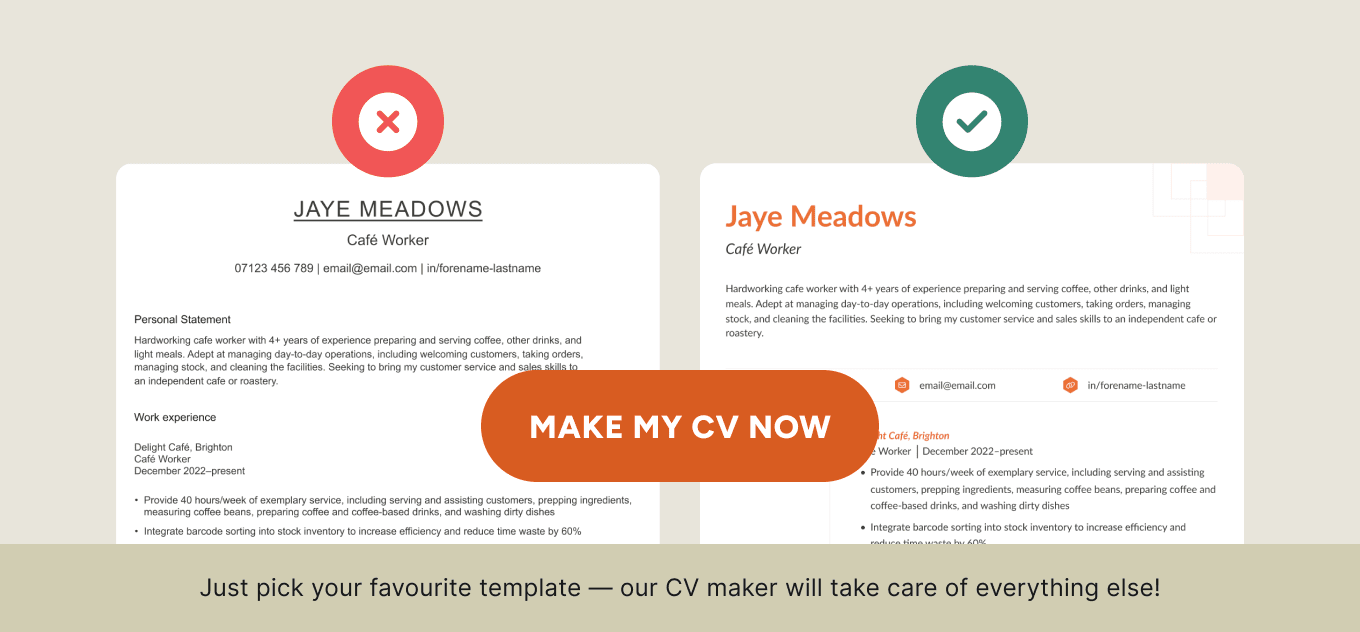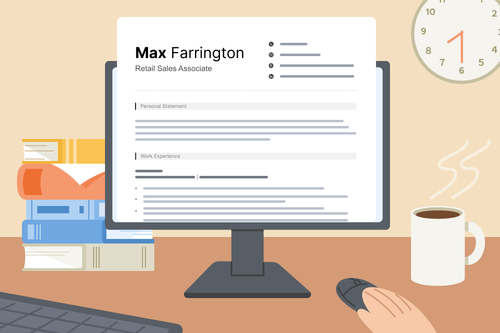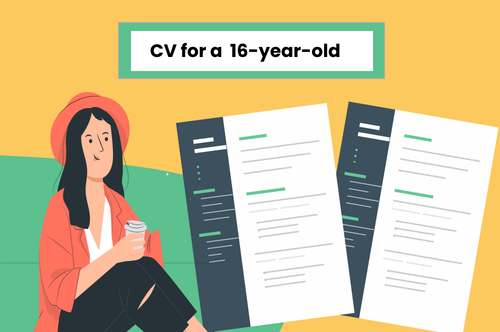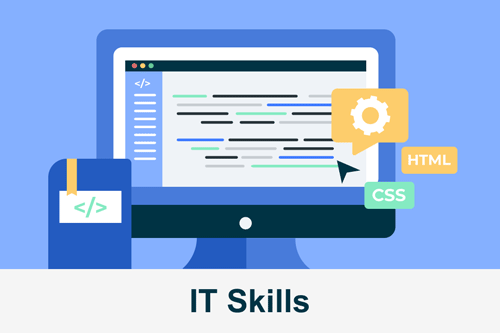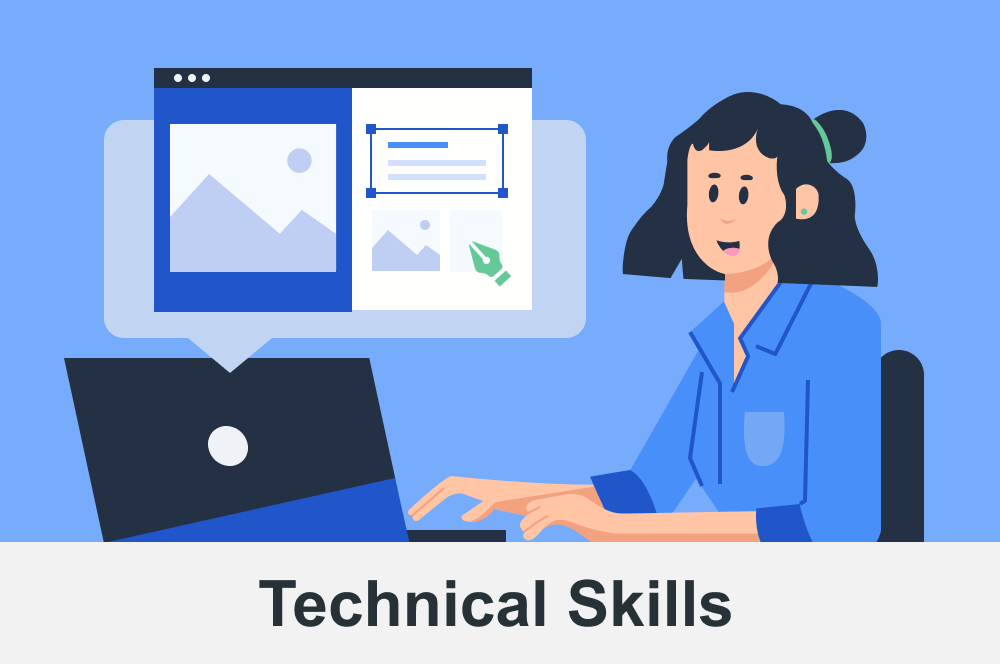Everyone is a bit of a natural at something.
Maybe you’re a people person, a strong writer, or just really good at listening to others.
Whatever your strengths are, you’ll be able to advance much faster in your profession if you’re able to identify your personal skills and qualities — and advertise them effectively to employers.
This article explains what personal skills and qualities are — and offers an overview of some of the best examples to highlight among your CV skills as you make your CV.
What are personal skills and qualities?
Personal skills and qualities are related to your personality and influence how you work individually and as part of a team.
Personal qualities are attributes of your personality. You often can’t train or optimise a personal quality. However, understanding your personal qualities is important for identifying the kind of work you’re most suited to — as well as determining whether you’d be a culture fit for a particular employer
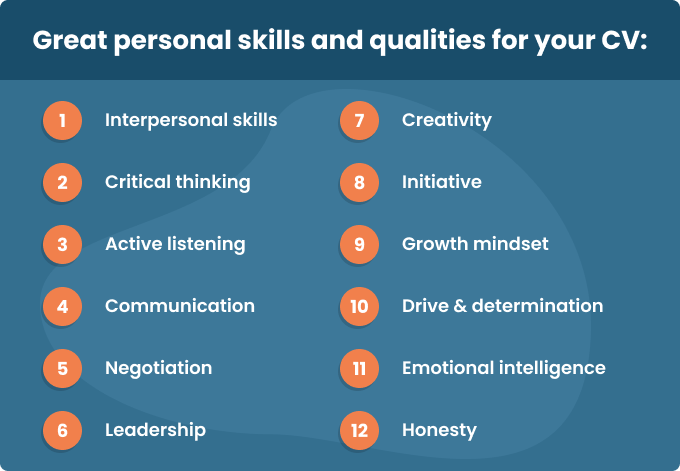
Personal skills, on the other hand, are qualities that you learn or develop over the course of your professional life, like critical thinking and written communication. Personal skills tend to be quite abstract in nature and can’t be directly gained by taking a class or getting a certification.
However, employers see these skills as highly valuable because they transfer well between industries and are crucial for problem solving, adapting to change, and continued professional growth.
12 great examples of skills and qualities for your CV
Here are 12 personal skills and qualities that employers love to see, as well as examples and tips for showcasing them as you write your CV:
- Interpersonal skills
- Critical thinking
- Active listening
- Written and verbal communication
- Negotiation
- Leadership
- Creativity
- Initiative
- Growth mindset
- Drive & determination
- Emotional intelligence
- Honesty
Personal skills examples
Personal skills are core abilities that you develop through life experiences.
1. Interpersonal skills
Also known as people skills, interpersonal skills enable you to interact positively with others and work well as part of a team. Professionalism, receptiveness to feedback, and conflict resolution are all examples of interpersonal skills, and while you can’t learn these abilities by taking a class, you do cultivate and develop them throughout the course of your life.
Possessing strong interpersonal skills makes you more adaptable, flexible, and open-minded, which is why employers value them so highly. Emphasise your interpersonal skills on your CV by giving specific examples of times you’ve communicated effectively, cooperated with others, or solved conflicts by showing empathy or being adaptable.
Here's an example of interpersonal skills in a work experience entry:
- Successfully resolved queries and complaints about billing issues by listening to their concerns, analysing their account history, and offering personalised solutions
- Upheld excellent customer service standards by remaining calm and patient when dealing with anxious or frustrated customers
- Collaborated with the product team to improve customer experience and streamline processes, resulting in a 30% decrease in average response time
2. Critical thinking
Critical thinking skills enable you to review and evaluate information independently to develop unique and practical solutions. Thinking critically involves gathering information, evaluating your options, and forecasting the results of your actions. With these skills, employees can approach challenges with a logical and strategic mindset, leading to more effective problem solving and decision making.
Critical thinking is highly desirable in today’s job market, with the IMF predicting that it’ll be one of the world’s most widely sought-after skills by 2025.
Highlight your critical thinking skills on your CV by emphasising any research roles, independent projects, or problem solving experience you’ve built up in previous roles.
Here’s an example of a personal statement that does a great job of foregrounding critical thinking skills:
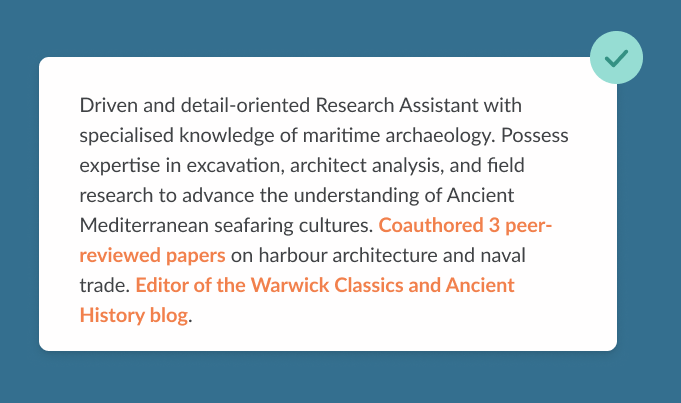
3. Active listening
Active listening is a powerful communication tool that allows you to fully engage with others, resulting in better teamwork, problem solving, and customer service.
Active listening is an important skill to develop because it builds trust and collaboration, and leads to better professional relationships, and creates a better working environment for you and your colleagues.
Using communication-focused action verbs on your CV can help emphasise active listening on your CV.
Active listening skills in a work experience entry
- Engaged with customers and paid close attention to their specific coffee preferences, leading to an increase in customer satisfaction and loyalty
- Anticipated and met customer needs by providing menu recommendations and responding promptly and professionally to customer inquiries or concerns
4. Written and verbal communication
Written and verbal communication is an umbrella term for a number of hard and soft abilities, including presenting skills, digital communication, creative writing, negotiation, and mentoring.
Demand for strong communication skills is very high in the UK, with a recent report by Skills Builder Partnership finding that a lack of eight essential skills (two of which are written and verbal communication) is costing the economy £22.2 billion each year.
Fortunately, proving your communication skills on your CV is relatively easy.
Write in concise, engaging sentences by using the active voice and carefully choosing relevant CV words that grab the employers attention. Make sure everything you include is relevant to the job you’re applying for and use a logical CV format to show you know how to organise your ideas clearly.
Here’s an example of great CV writing taken from a care assistant CV:
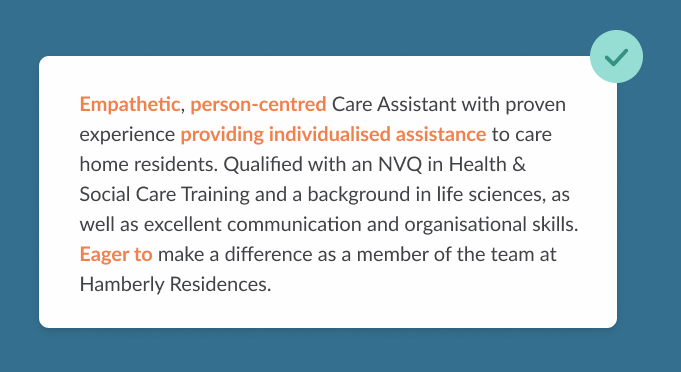
5. Negotiation
Regardless of your field, negotiation is a powerful skill to advertise to an employer. Negotiation skills enable you to achieve goals, build stronger relationships, and solve problems, by communicating with others to find mutually acceptable agreements.
Negotiation is often associated with industries like business services and law, but it’s a useful skill to possess in any professional area where teamwork, customer service, or problem solving skills are important (so, all of them).
Here's an example of negotiation skills in a work experience entry:
- Negotiated a contract extension with a major client by identifying areas for improvement within the desired time frame, achieving a 10% reduction in costs and high client satisfaction
6. Leadership
Leadership skills enable you to inspire, motivate, and guide others towards achieving common goals or objectives — so it’s easy to understand their appeal to employers. Types of leadership skills include delegation, decision making, coaching, and mentoring.
Hiring a strong leader isn’t just an investment in their specific role but also in those of their team members, as strong leadership leads to improved performance, morale, and career progression.
Highlight your leadership skills by giving specific examples of relevant experiences in your personal statement and work experience sections — as well as your cover letter.
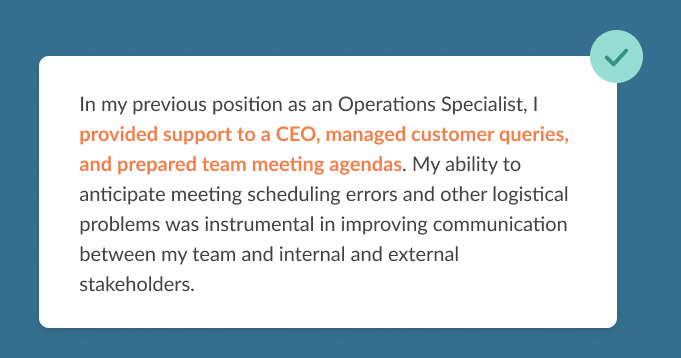
Personal qualities examples
Personal qualities are personality traits that determine your suitability for different kinds of work.
7. Creativity
Employers are always looking out for talented applicants who can bring fresh ideas and unique perspectives to their organisation.
Creative people are great problem solvers as they’re able to take novel approaches to the challenges they encounter. Creativity has applications in every industry, and its use of intuition, analytical thinking, and confidence makes it an essential quality for most leadership roles.
Demonstrate creativity in your work experience section by highlighting achievements where you worked independently, used your intuition, or developed an original solution. Here’s an example from a hospitality CV:
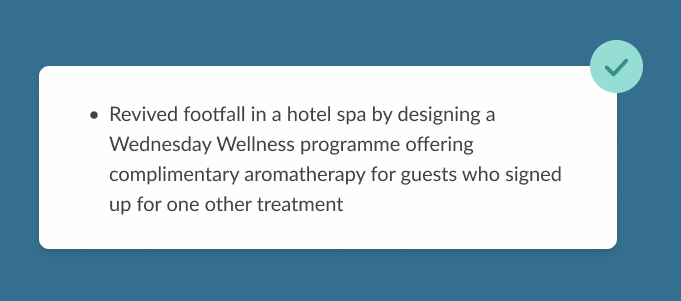
8. Initiative
Having initiative means that you’re able to work proactively and independently — a personal trait that employers love.
Initiative shows you’re resourceful, adaptable, and able to anticipate problems before they arise. You’re also more likely to try things out, take risks, and teach yourself new skills to stay ahead of the curve.
You can demonstrate your ability to take the initiative by highlighting a variety of independent projects, freelance work, and even hobbies and interests on your CV. Here’s an example of the latter:
Showing initiative in your hobbies and interests section
- Contemporary dance — amateur choreographer and member of a local dance group, competing in regular competitions
- Conversational Vietnamese speaker — self-taught in Hanoi dialect
9. Growth mindset
Having a growth mindset means that you strive to improve yourself through dedication, perseverance, and repetition. It’s all about realising that you have the power to develop your skills and tackle bigger challenges with a little bit of hard work and effort.
Employees who cultivate growth mindsets are more likely to be driven, motivated, and open to feedback.
How to emphasise a growth mindset on your CV
The purpose of your CV is to highlight the value you can add to the employer’s company. There are ways to emphasise your growth mindset as you do this:
- Emphasise independent work with additional sections like Projects, Hobbies and Interests, or Freelance Work
- Add a software or certifications section to highlight your eagerness to learn
- Use KPIs in your work experience section to show you track your performance and objectives
10. Drive & determination
Driven individuals are highly goal-oriented, possessing a clear understanding of what they want to achieve and working tirelessly to make it happen. They’re often self-motivated and take ownership of their work, needing less external motivation or guidance.
Drive is an instrumental personal trait for high-pressure or high-stakes jobs, as it enables you to push through and adapt to the circumstances in spite of adversity.
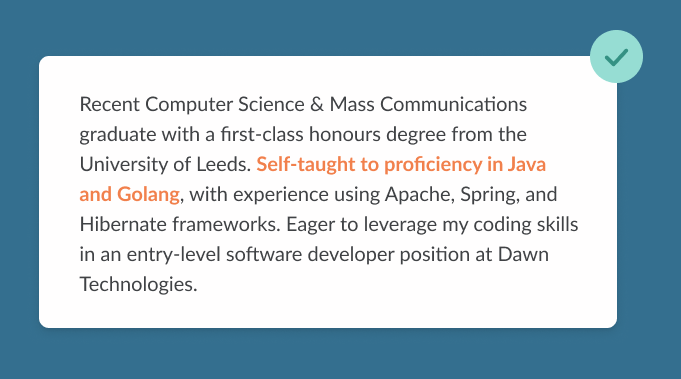
11. Emotional intelligence
Named by the World Economic Forum as one of the most valuable personal traits in leadership, emotional intelligence enables you to understand different needs and communicate with empathy.
Highly developed emotional intelligence underpins solid communication and teamwork, making it essential to all forms of collaborative work. If you’re looking for work in a customer-or patient-facing environment, emotional intelligence is important for guaranteeing high standards of service as well as upholding the reputations of both you and your employer.
Use care-oriented language action verbs and adjectives in your personal statement, work experience section, and cover letter to convey your empathy and emotional intelligence to employers.
12. Honesty
Honesty is the foundation of all good working relationships, so if your CV conveys your reliability and trustworthiness, then you’re definitely doing something right.
Honest workers are committed to their work and take responsibility for their actions. They’re also more likely to be transparent and open in their communication, making them great mentors and managers.
You build your trustworthiness over time, so it’s difficult to prove to employers on your CV. However, including mention of positive feedback, praise, or employee awards in previous roles is an effective way to show that you’ve built excellent working relationships with others in the past.
Example of honesty in a work experience entry
- Maintained over 95% five-star satisfaction rating by providing personalised support with various customer problems
- Received Employee of the Year award in 2022 for outstanding performance as both a customer support officer and mentor to new hires

